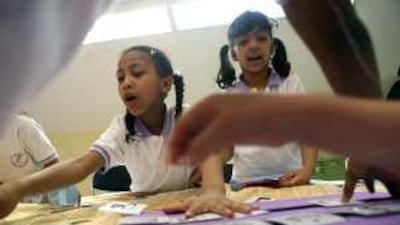The Ministry of Education's decision to postpone the academic year until after Ramadan has created another scheduling problem: how to make up for lost time without stretching the limits of teachers and students. Compounding the issue is the already skimpy school year, comprising just 155 days.
That leaves administrators with few options. Days can be added to the end of the year, days can be extended beyond the current 4.5 hours, test days can be used for instruction or students can attend school on Saturdays. But the reality is that only two are feasible, said Robert Thompson, a spokesman for the Abu Dhabi Education Council (Adec). "First, we use the 'downtime' that happens during exam time or other activities in schools," he said.
"This means we make more efficient use of the time, which allows us to add more instructional time to the school year without increasing the number of days." Mr Thompson said the other possibility was simply extending the school year. Both Adec and Dubai's Knowledge and Human Development Authority are waiting for a decision from the ministry before proceeding. A ministry spokesman confirmed that lost instructional time would be recovered.
In US schools, students attend class for 180 days; in Britain, that number is 190. And there is a sharp disparity in the number of hours spent in class each week, as well: 22.5 for students in the UAE compared with the international average of 27. Those differences are helping drive administrators' consideration of maintaining the amount of classroom time. The academic calendar was supposed to begin on August 30, after the start of Ramadan. When school continues during the holy month, teachers report dwindling attendance, and say students who do turn up are too tired to concentrate.
"We have had problems with Ramadan for three or four years," said Mohammed al Hammadi, the principal of Barqi Primary School in Al Ain. "It's not fair to the students to come to school. It's really hard for them. It's hot. They fast, they pray at night." But the late start does not solve everything, some educators and administrators say. Khalifa Alnaimi, vice principal at Al Tamiuz Model School in Al Ain, said he worried it could put too much pressure on students by creating a time crunch, which would affect performance.
"We will have many things to do in a short time," he said. Adding a day to the school week will not work either, he said: "The students will have only one day holiday, Friday, and this will make them come to the school upset." Fawzia al Genaibi, the principal of Sheikha Bent Suror Primary School in Al Ain, said working weekends would be difficult for teachers as well. "Everybody needs time to rest; you need two days off," she said. "Now almost everyone is doing a master's degree, and they are depending on those days to do their work."
Nadia al Dhaheri, one of whose daughters attends an Abu Dhabi primary school, was not impressed yesterday with any of the options on the table. She opposes the decision to push back school's start. Children "are bored now at home", she said. "It will be a long time." Extending the school year just postpones one problem, she said. "It will be very hot [next] June," she said. It's the holy month," said Um Mohammad Shehada, a mother of six who supports the ministry's decision to postpone the start of school. "You can make rest, we can have time for family and for the holiday."
Mira al Adawi, the mother of a child in nursery school, also supports the ministry's decision, but believes that Saturday school is not a solution. "Children they need time to play and enjoy the weekend without stress. "I think if they extend it in June it would be better. Last year both Saudi Arabia and Kuwait postponed the start of school until after Ramadan. That prompted parents and teachers in the UAE to ask for a similar delay. Officials said the decision, which applies only to state and private schools following the ministry's curriculum was partially a response to a question posed by Sheikh Mohammed bin Rashid, Vice President of the UAE and Ruler of Dubai, on the social networking website Facebook. A majority of people who responded to the question favoured a late start. klewis@thenational.ae

